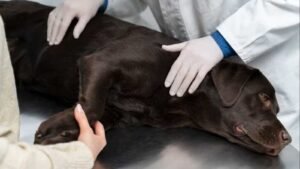The presence or lack of specific antigens (proteins and carbohydrates) on the red blood cell membrane determines blood type. Unless they have been previously exposed to antigens found on their red blood cells or other canine blood group antigens, dogs do not normally have antibodies against any of the antigens present on their red blood cells or other canine blood type antigens. Antibodies to antigens found in other dogs, on the other hand, can sometimes be detected without any prior exposure.
Dogs have more than 12 blood groups, and their red blood cells may contain any combination of these since each blood group is inherited independently. The most important of these is called Dog Erythrocyte Antigen (DEA) 1.1. Typing of blood donors and recipients is done before transfusion. Approximately 40% of dogs are positive for DEA 1.1, meaning that they have that antigen on their red blood cells. If a dog is DEA 1.1-negative and is given DEA 1.1-positive blood, it may develop antibodies that rapidly destroy the red blood cells if a second DEA 1.1-positive transfusion is given. By selecting donor animals that lack DEA 1.1 or that match the recipient, the risk of sensitizing the recipient can be minimized. A DEA 1.1-positive dog may receive either positive or negative blood.
Blood Type
The blood type of an animal is identified by seeing how a tiny sample of blood reacts to certain antibodies. Only the most powerful antigen, DEA 1.1, is regularly typed in dogs. There are at least 12 different blood group systems than DEA 1.1. If such cells are given to a previously sensitized dog, any antigen may trigger a response, despite the lower risk. Any dog that has received a blood transfusion before may develop antibodies to blood type antigens that are not present on their red blood cells. Antibodies can be identified by comparing red blood cells from a potential donor to plasma (the transparent, yellowish liquid portion of blood) from a receiver. A large crossmatch is the name for this technique. If agglutination happens, the recipient’s antibodies may attack the donated red blood cells, resulting in their destruction. That donor is incompatible and should be avoided at all costs.
Blood Transfusion
A blood transfusion is frequently required in an emergency, such as severe bleeding or the rapid loss of red blood cells owing to another disease. Anemia may need the use of blood transfusions. Animals with blood coagulation problems may require whole blood, red blood cells, plasma, or platelets transfusions. Acute destruction of red blood cells is the most significant danger of transfusion, which is generally triggered by a previously developed antibody to DEA 1.1 or another antigen. Fortunately, this is an uncommon occurrence. Antibodies to certain of the minor blood group antigens induce delayed death of red blood cells, which is a more prevalent issue in dogs who have undergone numerous transfusions. Infection from tainted blood, a drop in blood calcium levels, and fluid buildup in the lungs as a result of donating too much blood are all possible side effects of transfusions. Hives on the skin, fever, and vomiting are all possible side effects. Fortunately, the majority of blood transfusions are both safe and successful.


